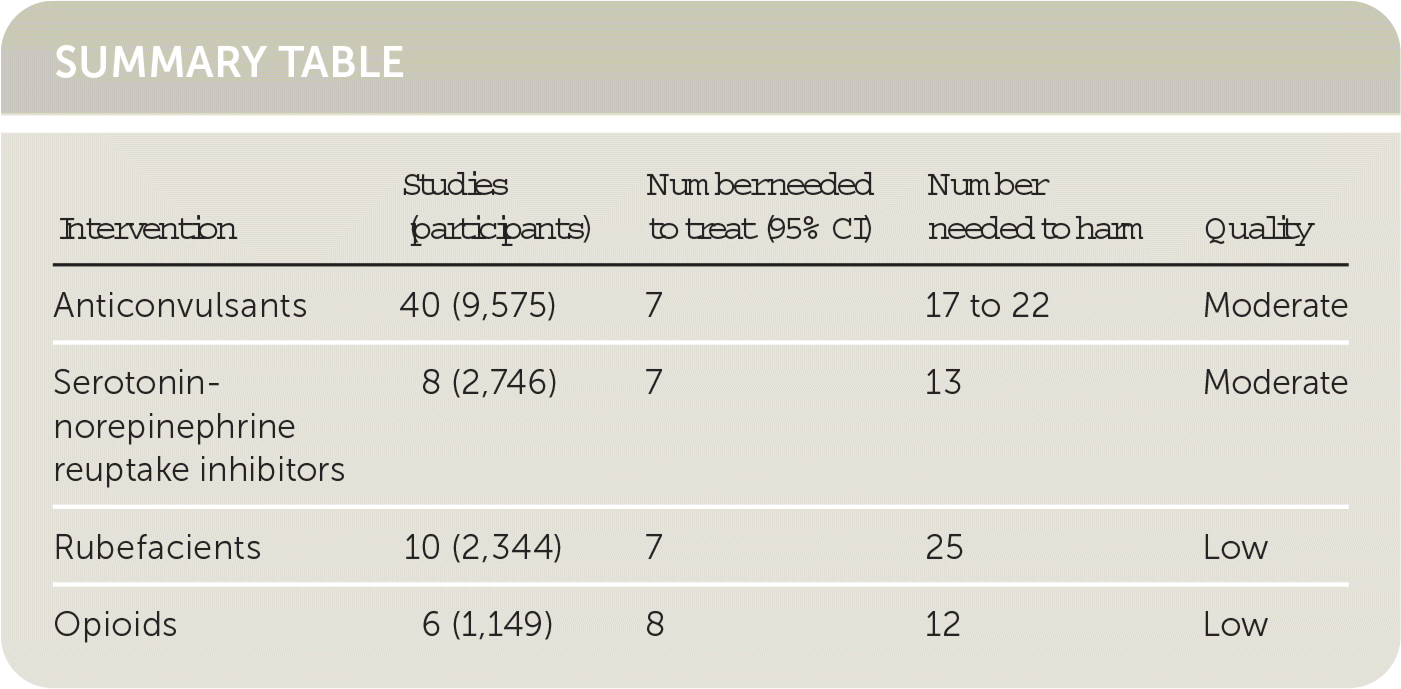
Am Fam Physician. 2021;104(5):online
Clinical Question
Which treatments for chronic neuropathic pain can provide clinically meaningful improvement?
Bottom Line
Given the balance of benefits and harms, there is moderately good evidence for anticonvulsants (pregabalin [Lyrica] and gabapentin [Neurontin] were similarly effective and well tolerated) and serotonin-norepinephrine reuptake inhibitors (SNRIs; with duloxetine [Cymbalta] and venlafaxine being similarly effective and well tolerated) for treating diabetic neuropathy and postherpetic neuralgia. Rubefacients (usually salicylates) appear to be effective but are less well studied with low-quality evidence. Acupuncture, opioids, and tricyclic antidepressants cannot be recommended based on current evidence. (Level of Evidence = 1a–)

| Intervention | Studies (participants) | Number needed to treat (95% CI) | Number needed to harm | Quality |
|---|---|---|---|---|
| Anticonvulsants | 40 (9,575) | 7 | 17 to 22 | Moderate |
| Serotonin-norepinephrine reuptake inhibitors | 8 (2,746) | 7 | 13 | Moderate |
| Rubefacients | 10 (2,344) | 7 | 25 | Low |
| Opioids | 6 (1,149) | 8 | 12 | Low |
Synopsis
This report describes findings from a series of meta-analyses of placebo-controlled randomized trials of at least three months' duration on the effectiveness of drug and nondrug treatments for chronic neuropathic pain, with a focus on diabetic neuropathy, postherpetic neuralgia, and trigeminal neuralgia. Only studies that provided results as the presence or absence of a clinically meaningful response, defined as at least a 30% improvement on a scale of pain and/or function, were included. Studies in pregnant patients, of acute pain, and those with an active comparator were excluded. The authors found no qualifying studies for trigeminal neuralgia, or for topical lidocaine or exercise as interventions. The authors identified 40 randomized controlled trials with moderate certainty of evidence for anticonvulsants; the bulk of the evidence was for pregabalin and gabapentin, and both were effective (number needed to treat [NNT] = 7 for one patient to respond; number need to harm [NNH] = 17 to 22 for withdrawal due to adverse events). Rubefacients (topical drugs that cause irritation and redness of skin) were studied in 10 randomized controlled trials with low certainty of evidence; low-dose patches or creams and high-potency patches were similarly effective (NNT = 7) and were generally well tolerated (NNH = 25 for withdrawal). The SNRIs duloxetine, venlafaxine, and desvenlafaxine (Pristiq) were studied in eight moderate-certainty studies, with an NNT of 7 for response and NNH of 13 for withdrawal. Opioids were studied in six low-certainty studies, with an NNT of 8 for one patient to respond but a similar NNH of 12 for withdrawal due to adverse events. Acupuncture was only studied in three trials with very low certainty; no significant benefit was detected, although the confidence interval is wide (relative risk = 1.81; 95% CI, 0.55 to 6.0). Tricyclic anti-depressants were studied in only two small, low-certainty studies and no significant benefit was seen in the appropriate random effects meta-analysis. Results are summarized in the accompanying table.
Study design: Meta-analysis (randomized controlled trials)
Funding source: Self-funded or unfunded
Setting: Various (meta-analysis)
Reference: Falk J, Thomas B, Kirkwood J, et al. PEER systematic review of randomized controlled trials: management of chronic neuropathic pain in primary care. Can Fam Physician. 2021;67(5):e130–e140.
Editor's Note: Dr. Ebell is deputy editor for evidence-based medicine for AFP and cofounder and editor-in-chief of Essential Evidence Plus, published by Wiley-Blackwell.
